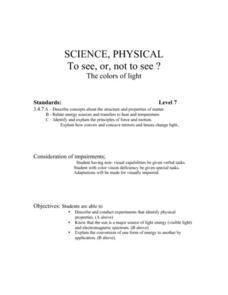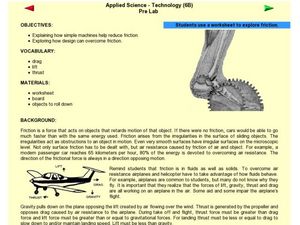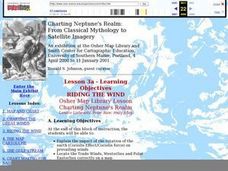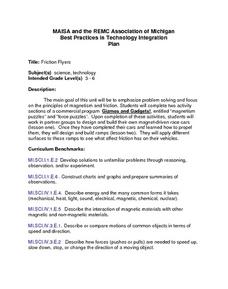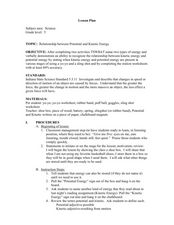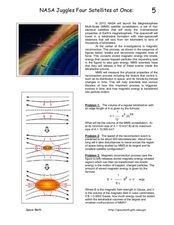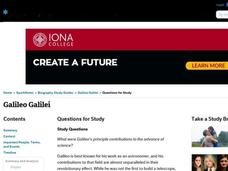DiscoverE
Kicking Machine
Don't kick the resource to the curb; you'll definitely regret it. Future engineers devise a kicking machine that launches a ping-pong ball toward a target. They can use a pendulum, a rubber band, or both, depending on whether they want...
Curated OER
Tracking Hurricanes
Learners explore how technology and science are used to identify, measure, and track powerful tropical storms to better warn and secure people from their impact. They research hurricanes online by tracking the storms on a hurricane website.
Curated OER
100 Years of Flight
Students investigate Bernoulli's principle of air pressure and how it
relates to the lift of an airplane. Students identify various Aeronautical vocabulary terms. Students construct a paper glider and experiment with the control surfaces...
Curated OER
Plate Tectonics
Pupils identify that most of mountain ranges found on all major land masses and in the oceans are external reflections of tectonic movements within the earth. They identify that earthquakes and related phenomena are caused by the...
Curated OER
To See or Not to See: The Colors of Light
Seventh graders describe and conduct an experiment that identifies the physical properties of light. They explore sources of visible light and an electromagnetic spectrum. Students explain the conversion of one form of energy to another.
Curated OER
Games with a Large Parachute
Young scholars control the parachutes using arm movements. They follow directions while participating in games. They explore the effects of wind on several objects and study the effects of shape, size and weight on a parachute.
Curated OER
Parachutes
Students control the parachutes using arm movements. They follow directions while participating in games. Students explore the effects of wind on several objects. They study the effects of shape, size and weight on a parachute.
Alabama Learning Exchange
Energy and Work Amusement Park Style
Students distinguish between kinetic and potential energy. They recognize that energy can change from one form to other forms. They identify and describe several forms of energy.
Curated OER
Applied Science -Technology (6B) Pre Lab
Sixth graders discuss how simple machines overcome friction. In this simple machine lesson, 6th graders review the parts of a plane and how they make up for gravity and friction. They roll different objects down an inclined board...
Curated OER
RIDING THE WIND
Students locate the Trade Winds, Westerlies and Polar Easterlies on a map, explain the impact of the rotation of the Earth, and plot a route for a round trip voyage from New York to London.
Curated OER
Friction Flyers
Students explore the principles of magnetism and friction. They complete an interactive puzzle on the Gizmos and Gadgets computer software, construct a vehicle, build and modify ramps and vehicles to produce various outcomes, and...
Curated OER
Relationship between Potential and Kinetic Energy
Fifth graders explore the relationship between potential energy and kinetic energy. In this energy lesson plan, 5th graders examine objects and describe potential and kinetic energy of the objects. Students complete two...
Curated OER
Weight, Friction, and Equilibrium
In this weight worksheet, students read about weight, friction, and equilibrium. Students then complete 10 matching, 7 fill in the blank, and 8 word problems.
Curated OER
Water Pressure Experiments
Young scholars perform experiments measuring water pressure. They record their observations after poking holes in plastic bottles filled with water with the lids on and then off. They discover the role gravity plays in the water flow.
Curated OER
Applied Science - Technology (2A) Post Lab
Second graders explore simple machines. In this technology instructional activity, 2nd graders look at pulleys and gears and what the uses are for each. They complete a worksheet comparing the two.
Curated OER
Impulse and Momentum
Students are introduced to the concepts of impulse and momentum and problem solving strategies for these types of problems. In groups, they discover the law of conservation of momentum and share their answers with the class.
Curated OER
Catapult Creations
Third graders design and build a catapult. For this lever lesson, 3rd graders collect a variety of lever type objects. Students build a catapult and launch marshmallows or crumpled paper and see who can hit the designated target.
Curated OER
Boomerangs Keep Coming Back
Students investigate the flight of paper boomerangs. In this flight lesson, students examine the flight variables of paper boomerangs, which they make, by investigating the concepts of lift and drag. They examine what happens when an...
Curated OER
NASA Juggles Four Satellites at Once
In this NASA satellites activity, students read about the Magnetosphere Multi-Scale satellite constellation that NASA will launch in 2013. They solve 4 problems including finding the volume of the MMS constellation, finding how long it...
Curated OER
Galileo Galilei Questions for Study
In this online interactive philosophy worksheet, students respond to 10 short answer and essay questions about Galileo's contributions to science.
Curated OER
Hurricanes 2: Tracking Hurricanes
Students examine the role of technology in identifying and tracking hurricanes.
Curated OER
Galileo: His Times & Beliefs
Students study Galileo and his scientific discoveries. They complete a series of experiments/model constructions, using 17th century equipment and procedures, to "recreate," demonstrate and explore the various discoveries of Galileo.
Curated OER
Principles of Flight: Bernoulli's Lift
Students discover how air pressure effects flight. In this physics lesson, students create two types of airplane wings so they can observe the way air pressure creates lift. Students utilize a printout to create the airplane...
Curated OER
Gravity Launch
Pupils use an online interactive to launch a rocket from earth. They have control over the angle and thrust of the rocket to discover the relationship between the two.






